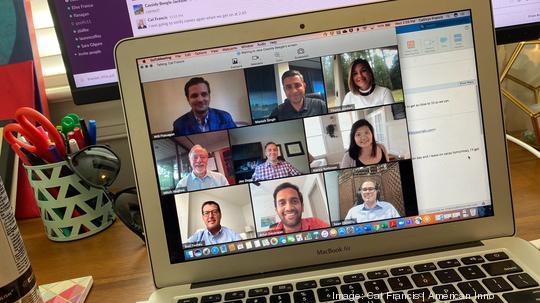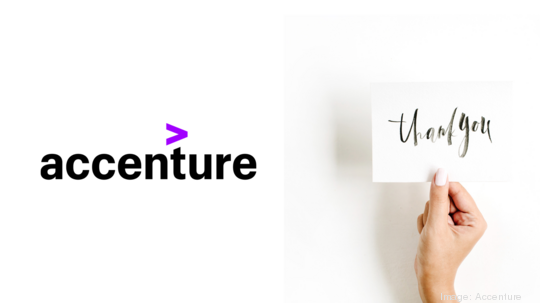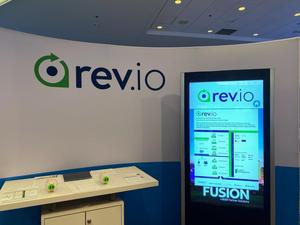
Artificial intelligence is simply a tool businesses and organizations can use to make data more relevant and powerful, panelists said during Atlanta Inno’s State of Innovation in AI event.
AI doesn’t replace humans, tech leaders said. It bridges gaps to better connect and serve companies and consumers.
Atlanta Inno brought together regional AI leaders to discuss how they’re leveraging AI, especially at a time many businesses are working remotely.
Will Flanagan, director of strategy and product at American Inno, moderated the discussion, which kicked off with a showcase featuring ViZZ, Sideqik, Oversight and Toucan AI — all Atlanta businesses using the technology in innovative ways.
ViZZ is a disruptive VI (Visual Intelligence) software company that pairs 3D and AI to enable users to digitally mirror projects and environments.
The company serves the architecture, engineering and construction industry as well as hospitality and facilities management companies.
Sideqik endeavors to help brands grow and engage their online communities through influencer connections.
Oversight helps companies mitigate risks with an AI-powered platform that plays online detective with travel and expense reports, purchase and fleet cards, payables, procurement and general ledger entries.
Toucan AI is a platform for e-commerce businesses that helps track and grow sales with an automated salesperson.
After brief comments from the showcase participants, Flanagan led panelists’ discussion about how their companies are using AI.
Titania Jordan, chief patent officer at Bark, said that company offers technology to keep “children safer online and in real life using AI.”
Bark alerts parents and caregivers about online predators, signs of suicide ideation and depression, bullying and acts of violence.
“Kids are on devices more than eight hours a day,” Jordan said.
While parents should pay attention to how their children are using technology, it can be “cumbersome, and children are often more tech-savvy.”
Bark customers are more interested in what the platform does than how it works, she said.
“You might not know how our algorithm works, but when you see an image of a Twitter direct message that a potential predator has sent a minor, you get it. You get it, and you appreciate it,” she said.
Sean Flaherty, vice president of global retail and e-commerce strategy for UPS, noted that “knowledge without action is trivia, and data without insight is equally trivia.”
UPS, he said, “sits on a massive amount of data related to all those millions of packages that e-commerce is driving.”
AI helps UPS optimize drivers’ routes, saving time, money and energy. That’s been especially important during the Covid-19 pandemic, where the volume of package deliveries surged 40% to 60%.
Consumers, he said, “expect companies like UPS to pivot and be efficient and answer the call that was necessary to get all those packages delivered."
“Our customers don’t necessarily need to know how the package got to their doorstep,” he added.
Joe Depa, managing director and applied intelligence lead for the South market unit at Accenture, said the pandemic “has really accelerated the adoption of AI.”
AI is a tool that companies can use to “build a more flexible organization,” he said. “The power of AI can only be harnessed with the right people in place.”
He noted that a study Accenture did reported that 80% of executives surveyed said they had failed to scale AI while, at the same time, 84% said they knew that they would have to achieve AI at scale to meet their business goals.
“That struggle usually comes down to not having the right data in place or the right talent in place,” he said.
Bob Toohey, president of Pymetrics, a talent-matching platform, said that his company uses AI to help job seekers and employers better align.
“We believe everyone has potential” outside a resume or degree," he said.
Pymetrics uses tools such as a 25-minute gamification to uncover more information about job seekers and help guide them to jobs that are a good fit.
“At our core, we really look to de-bias and put a fair process in place,” he said.
AI is still an unknown for many people, he said.
“There’s still this ‘Oh my, were using AI’ ” mindset among some people, he said. “But... we’re just tipping the iceberg.”
Companies looking to bring AI on as a tool should ask what problems they’re trying to solve and what their pain points are.”
AI is often “seen as a cure-all,” Depa said, “but it’s one piece of the toolkit. It’s not a magic potion if you don’t have the right people around it.”
The right people and the right culture are paramount to successful use of AI, Toohey said.
Flanagan asked panelists about how to make sure AI is responsible.
Flaherty noted that UPS is “always trying to find better ways to serve customers. You have to do that in a way that’s not disconcerting.”
It would be creepy if UPS told a customer “we see you’re not home on Tuesday afternoons, would you like us to schedule a different time?” he said.
“Most companies are trying to figure out how to make it as easy to use as possible, and that means as human as possible,” Flaherty said. “This doesn’t mean Skynet and the Terminator. It’s about tools in the hands of humans and human-centered design to help them make more powerful decisions.”
Jordan concurred. “Bark is not a replacement for effective, engaged parenting” but rather a tool just like a bike helmet or sunscreen, she said.
“You have to keep talking about these issues,” she said. “You can’t just set it and forget it. AI can’t become smarter and better without training and guidance.”
Panelists said they’re eager to see AI grow in Atlanta — bolstered by its universities.
Students entering the workforce will stand out with AI experience, they said.
“There’s no question that we have more data than people to analyze and interpret it even with the assistance of AI and machine learning,” Flaherty said. “It’s like being in computer programming in the 1960s or ’70s.”
Toohey agreed. “It’s like the Cloud was 10 years ago,” he said.
As AI progresses, more companies need to ask “What can this do for me and what’s in it for me instead of how does this work?” Jordan said.
AI is not a fad, Flaherty said.
“It’s not this buzzword thing. It’s just the way we’re going to consume the vast qualities of data that we haven’t been able to swallow before,” he said. “It’s going to drive our businesses forward and solve problems that maybe couldn’t previously be solved.”
Want more? Get the full conversation below.
Learn more about Accenture’s research as well as view their User First: Flexible data for better decisions report.
AI conversation was powered by Accenture.








